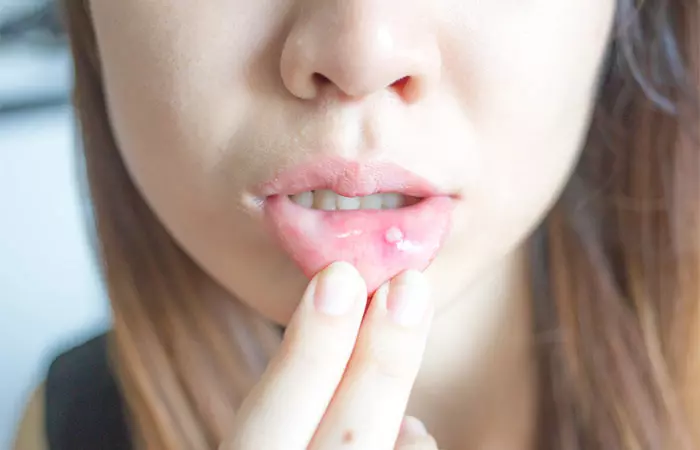11 Dangerous Side Effects Of Peppermint Oil
Be careful with this essential oil as it may cause some serious adverse reactions.

Image: StyleCraze Design Team
Peppermint oil is often chosen for its calming effects and other benefits it offers. But recent research sheds some light on the side effects of peppermint oil. While some of these are mild, others require medical attention.
This aromatic oil is a sign of hospitality in many cultures. It is a popular fatigue-easing and de-stressing agent. Also, it is known to manage many health ailments, including irritable bowel syndrome and headaches. But the side effects of this oil should also be kept in mind, and one must know how to manage these undesirable effects effectively. Learn more about the possible negative effects of peppermint oil and how they can impact your health. Read on.
 Know The Flip Side: Peppermint Oil
Know The Flip Side: Peppermint OilShort-Term Effects
Indigestion, heartburn, skin rashes, blisters in mouth, intense headaches and dizziness.
Long-Term Effects
Aggravates the risk of seizure, breathing problems in children, damage to lungs, and miscarriage in pregnant women.
Drug Interactions
It can interact with antacids, causing heartburn or severe GERD, and immunosuppressant drugs.
When To See A Doctor
If you experience slow heartbeat (especially if you have a history of cardiovascular disease) , and uterine relaxation (especially if you are pregnant).
In This Article
Peppermint Oil Side Effects
Listed below are the potential side effects caused by peppermint oil:
1. Harmful For The Digestive System
Even though peppermint oil is used to calm down a disturbed digestive system, the relaxing nature could potentially trigger indigestion and heartburn. Studies suggest that relaxing the sphincter muscles could probably result in the gastric acids flowing backward into the esophagus. Hence, people suffering from gastroesophageal reflux disease and hiatal herniai A condition that occurs when part of the stomach bulges through the diaphragm into the chest. should be careful while using peppermint oil. Studies also indicate that people with gastroesophageal reflux diseases are known to be at a higher risk for developing nausea, gas, constipation, diarrhea, bloating, vomiting, and heartburn if they use antacid capsules coated with peppermint oil (1).
 Trivia
Trivia2. Skin May Erupt Into Rashes

Med Line Plus, a health portal run by the U.S. National Library of Medicine and the National Institutes of Health, points out that people who used peppermint oil had eruptions and rashes on their skin. Hence, it is advisable to use a maximum of 0.4 milliliter peppermint a day, the dose divided into three equal parts, to avoid these skin issues (2).
3. Intense Headaches And Dizziness

This is one of the most discussed peppermint oil side effects. Various studies conducted on the potential dangers of peppermint oil report people suffering from intense headaches and dizziness after using this essential oil. This could probably arise due to the overuse of the same.
4. Large Doses Lead To Risk Of Seizures
Studies indicate that using this essential oil in extremely large dosages are known to have grave negative impacts on the user, including muscular weakness, brain damages and seizuresi Sudden electrical disturbances in the brain that cause changes in behavior, movement, or awareness . If you are experiencing nausea, difficulty breathing, coughing, wheezing, slowed heartbeat, dizziness, and/or convulsionsi Sudden, uncontrollable muscle spasms, often linked to seizures. , then it could be because of using peppermint oil. Call in for medical care at the earliest to avoid complications.
5. Breathing Problems In Children And Infants
It is safer for adults use peppermint oil, in recommended doses, for steam inhalation and other purposes.
However, children and infants should strictly be kept away from the nuances of this oil. Studies have proven that they could be at a risk of life threatening conditions, such as invasive spasms preventing their breathing ability (3).
6. Blisters In The Mouth And Nostrils

Peppermint oil is akin to menthol. And, so if you are allergic to menthol, then you might probably have allergic reactions like skin irritation, developing blisters in your nostrils, and mouth sores if you use peppermint oil for inhalation. It may also cause throat irritation. Avoid any medication that has peppermint oil in its ingredient list to avoid these side effects. This is considered to be one of the major peppermint oil inhalation side effects.
7. Interactions With Prescription Drugs
This oil is known to interact with certain prescription drugs, triggering unwanted and uninviting complications. Drugs, such as cyclosporine and antacids quite often come with a coating of peppermint oil. In these cases, the coating breaks down faster, triggering heart burns or GERD on a dangerous level. Plus, the over the counter medications for acid reflux also interact with this oil in the above outlined way, with the dangers transitioning into life threatening ones (4). Always consult your doctor before using peppermint oil if you are on any medication. They can help you assess whether peppermint oil is safe for your specific circumstances and guide you on proper dosage or alternative remedies.
 Trivia
Trivia8. Slows Down The Rate Of Heart Beat

Peppermint oil might help lower blood pressure, but the research has been somewhat inconclusive. Some studies suggest that peppermint can reduce heart rate and systolic blood pressure by relaxing the muscles in our blood vessels. However, another study found that inhaling peppermint aroma did not affect heart rate or blood pressure (5). Another study found that this oil may interact with antihypertensive medications. Taking peppermint oil capsules such medicines might increase their strength and cause vasodilation, which may further reduce blood pressure levels (6). However, more large-scale studies are needed to fully understand how peppermint affects blood pressure and its safety when combined with medications. So, if you have any cardiovascular conditions, then please stay away from this oil.
9. Harms Lungs

It has been reported that this oil, when used in the form of injections, could possibly harm your lungs, with the worst being a complete damage (4).
10. Unsafe For Pregnant And Lactating Women
Researchers are yet to prove the safety of this oil to be used by a woman when she is either pregnant or lactating. Studies suggest that the use of this oil, in certain cases, during the initial stages of pregnancy, could result in uterine relaxation. This, in turn, could result in miscarriage. So if you have a history of miscarriages, then please stay safe.
While it has been noticed that the side effects of peppermint oil occur mainly due to improper usage. Studies have strictly advised the non-usage of this oil by the following category of people to avoid any kind of complications:
- Infants and children.
- Pregnant and breastfeeding women.
- People having a history of heart diseases.
- People suffering from gallstones.
11. May Lead To Eye Irritation
Peppermint oil contains menthol that may irritate the eyes. Studies found that exposure to this oil may evoke sensations of irritation and cooling (7). These findings highlight the sensitivity of the eyes to menthol’s cooling properties and the potential for discomfort when it comes into contact with the ocular surface.
Learning the side effects of peppermint oil can empower you to take precautions that help maximize its benefits and minimize the risk of discomfort and complications. Scroll down to know more.
How To Mitigate The Side Effects Of Peppermint Oil
Although peppermint oil has numerous positive benefits, some people may experience allergic reactions, heartburn, or skin irritation. But, there are some tips you can follow to avoid these side effects to some extent, such as:
- Always dilute peppermint oil with a carrier oil (such as coconut or olive oil) before using it topically to lower the possibility of adverse effects.
- Avoid taking large amounts of peppermint oil if you have digestive discomfort because it can cause heartburn or acid reflux.
- If you notice any irritation, stop using the product immediately and rinse the area with water and mild soap.
After taking these precautionary steps, you should also know some recommended safe usage practices that can guide you toward a more effective and comfortable experience. Read on!
Recommendations For Safe Use Of Peppermint Oil
There are some guidelines you can follow to safely use peppermint oil, such as:
- Dilute the oil with a carrier oil (1-2 drops of peppermint oil per teaspoon of carrier oil) before applying it to the skin.
- Use a diffuser only for about 30 minutes at a time to avoid irritating your respiratory system.
- Never consume undiluted peppermint oil and always get medical advice before using it. Follow the recommended dosage instructions and, if available, use peppermint oil capsules.
- Don’t let children under the age of 2 years old apply or consume peppermint oil, unless recommended by a doctor.
- Consult a doctor before using this oil if you are pregnant or breastfeeding.
Key Takeaways
- Peppermint oil may result in health problems like irritable bowel syndrome and headaches.
- It also may cause indigestion and abdominal pain by disturbing the digestive system.
- If you have sensitive skin or allergies, strictly avoid the oil, as it can cause rashes.
- The oil tends to react with certain prescription drugs, which may lead to acid reflux, GERD, and heart burns.
Infographic: Peppermint Oil Side Effects To Watch Out For
There is a craze for peppermint essential oil all over the world. However, its potential side effects on your skin and body may make you reconsider its use. Most of these reactions only occur if you use the oil excessively or fail to properly dilute it, leading to the use of a higher concentration of the oil.
Check out the infographic below to learn more about the adverse effects of peppermint essential oil on your skin and health. Illustration: StyleCraze Design Team
Peppermint oil benefits are widely recognized. It is particularly known for its calming effect. However, it may also cause some negative effects. The side effects of peppermint oil include rashes, headaches, dizziness, and blisters in the mouth and nostrils. It may also interact with certain medications and may exhibit toxicity if used in higher amounts. Peppermint oil should be kept away from children and infants as it may trigger breathing issues. The oil, in large doses, may also lead to seizures and harm the digestive system. It is also unsafe for the lungs and pregnant and lactating women. Caution is highly advised.
Frequently Asked Questions
Does peppermint raise blood pressure?
No. Your systolic blood pressure drops significantly after consuming about 50 microliters of peppermint essential oil (6).
Can I spray peppermint oil on my bed?
Yes, it is safe to spray peppermint oil on the bed. However, ensure it is appropriately diluted as it may otherwise lead to nausea, dizziness, or give you a headache.
Is it okay to take peppermint oil every day?
Yes, but you should talk to your healthcare provider before taking it to find out the right dosage.
Can peppermint oil affect kidneys?
As per a case study, a high dose of peppermint oil can cause acute renal failure (3).
Is peppermint oil a blood thinner?
There are no scientific studies to support that peppermint oil is a blood thinner. However, if you are taking anticoagulant medicines, consult your doctor before consuming peppermint oil.
Can peppermint oil cause liver damage?
It contains pulegone, which is a recognized hepatotoxin. It is found in young peppermint leaves and later metabolizes into menthol. Therefore, it may cause damage to liver cells (3).
How many drops of peppermint oil is safe?
The safe recommendation of peppermint oil is 1-2 drops. However, consult your doctor to find out the correct dosage based on your medical history.
Illustration: Top Peppermint Oil Side Effects You Never Knew About

Image: Stable Diffusion/StyleCraze Design Team
Delve into the world of peppermint oil, cherished for its soothing aroma and versatile household uses. Unravel its health benefits and potential side effects through this captivating video.
References
Articles on StyleCraze are backed by verified information from peer-reviewed and academic research papers, reputed organizations, research institutions, and medical associations to ensure accuracy and relevance. Read our editorial policy to learn more.
- A Novel Ileocolonic Release Peppermint Oil Capsule for Treatment of Irritable Bowel Syndrome
https://pure.rug.nl/ws/portalfiles/portal/76112978/Weerts2018_Article_ANovelIleocolonicReleasePepper.pdf - Review article: The physiologic effects and safety of Peppermint Oil and its efficacy in irritable bowel syndrome and other functional disorders
https://www.ncbi.nlm.nih.gov/pmc/articles/PMC5814329/ - A near fatal case of high dose peppermint oil ingestion- Lessons learnt
https://journals.lww.com/ijaweb/Fulltext/2012/56060/A_near_fatal_case_of_high_dose_peppermint_oil.16.aspx - Therapeutic Uses of Peppermint –A Review
https://www.innovareacademics.in/journal/ajpcr/Vol2Issue2/187.pdf - Instant effects of peppermint essential oil on the physiological parameters and exercise performance
https://www.ncbi.nlm.nih.gov/pmc/articles/PMC4103722/ - Simultaneous Use of Herbal Medicines and Antihypertensive Drugs Among Hypertensive Patients in the Community: A Review
https://www.ncbi.nlm.nih.gov/pmc/articles/PMC7868580/ - Abnormal activity of corneal cold thermoreceptors underlies the unpleasant sensations in dry eye disease
https://www.ncbi.nlm.nih.gov/pmc/articles/PMC4733818/
Read full bio of Eva De Angelis
Read full bio of Tanya Choudhary
Read full bio of Ravi Teja Tadimalla
Read full bio of Moksha Gandhi

























Community Experiences
Join the conversation and become a part of our empowering community! Share your stories, experiences, and insights to connect with other beauty, lifestyle, and health enthusiasts.